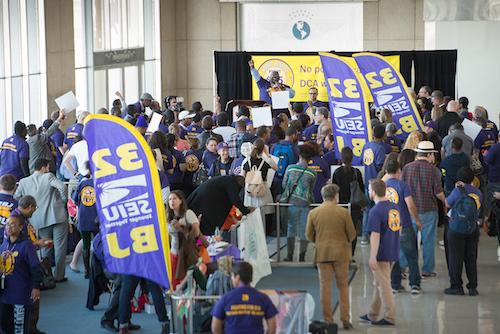Union Sabotages NYC Airports

By Abby Streu
On August 3, 1981, 7000 domestic flights were cancelled at airports across the nation.
Multiply that number by however many people were supposed to travel in each of those airplanes, and you get a large group of unhappy consumers. Such a large number of cancelled flights has a domino effect in the universe—businessmen can’t get to cross-country meetings, expensive vacations are lost, parents aren’t able to make it home to see their children.
Now, flights don’t get cancelled for kicks and giggles. In this case, it was because a union didn’t get its way.
On that August day, 13,000 air traffic controllers walked off the job. Their god-union, the Professional Air Traffic Controllers Organization (PATCO), had abandoned negotiations with the Federal Aviation Administration (FAA), the federal agency that regulates all air traffic in the United States.
PATCO had strutted up to the bargaining table and slapped down a hefty $770 million package, which included a $10,000 annual increase in pay for each air traffic controller and a decrease from a 40 hour to a 32 hour work week. The FAA countered with a $40 million package.
That’s when PATCO mobilized its members into picket lines, forcing airlines to cancel thousands of flights.
Fast forward 36 years. On July 11, 2017 at 9:00pm, 700 workers at three New York City airports did the same thing. The striking workers at LaGuardia, JFK, and Newark airports were composed of wheelchair attendants, baggage handlers, customer service representatives, plane and airport maintenance staff and shuttle drivers, all of whom are employed by PrimeFlight Inc. PrimeFlight is a subcontractor that provides ground and maintenance services for United Airlines, American Airlines and Jet Blue.
The PrimeFlight employees are represented by a local Service Employees International Union (SEIU). On July 10, 2017, SEIU filed a complaint against PrimeFlight with the National Labor Relations Board (NLRB), claiming the company refused to acknowledge the unionization of their workers by declining to bargain with them. The next day, the employer was notified by the NLRB about the complaint and workers began to strike. On July 12, the strikers planned to form a picket line outside the American Airline departures at LaGuardia airport as well as at JFK the next day.
But the planned picketing did not go forward because the strike was cut short the morning of July 12. Rob Hill, the vice president of the union, released a statement, explaining, “While the strike is suspended as negotiations get underway, the airport workers are ready to go back on the strike should talks fall apart.”
The negotiations are still ongoing, and air traffic has seen few side effects, but the looming potential for a strike brings a good question to light: Why are consumers and businesses the ones with so little say in this scenario? In the case of the 1981 strike, thousands of paying customers were stripped of their plans to get away, proceed with business as usual, or see their loved ones. Airlines involved were forced to lose business that day and had to refund every cent because a union’s demands could not be met.
Today, Europe has been experiencing similar situations with their airports. In March of this year, striking French air traffic controllers caused over a thousand flights to be cancelled. British Airways has had a slew of walkouts from their employees since January 2017, with the latest currently ongoing.
The 1981 strike ended when President Ronald Reagan fired the strikers who refused to come back to work. The non-striking air traffic controllers were aided by military controllers and supervisors, and were successful in restoring air traffic to almost-normal levels, allowing the public to proceed with life as usual and for airline companies to resume business.
No flights ended up being cancelled during the recent New York City strike, but that was a looming threat. And who’s to say that won’t happen the next time union members decide their needs aren’t being satisfied? How long should airlines and their customers be under the threat of blackmail from unions?





